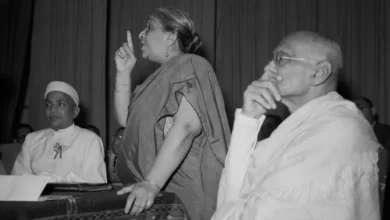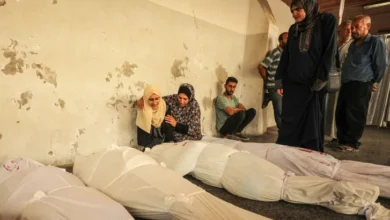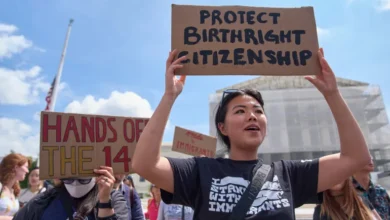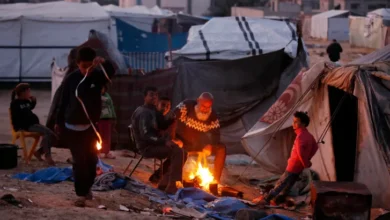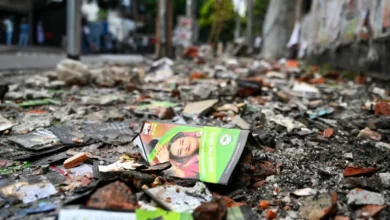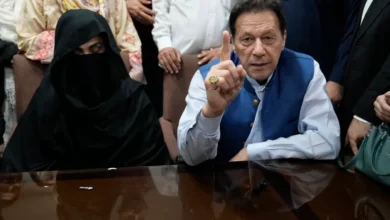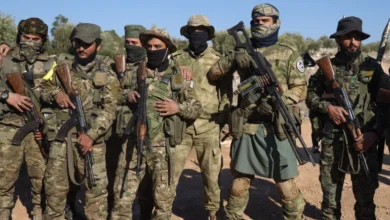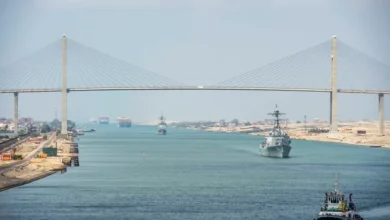‘Maximally pragmatic’: How Central Asia navigates Russia’s war on Ukraine
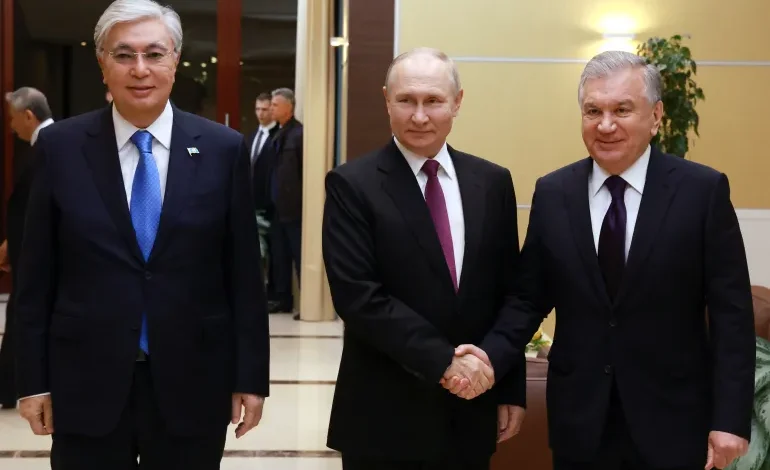
A separatist warlord turned Russian lawmaker said he wasn’t “kidding around” when calling for Moscow to annex Uzbekistan and other Central Asian nations whose citizens flock north in search of jobs.
“I sincerely stand for a simple annexation of all territories labour migrants come to us from, for teaching them Russian right where they are. Not here, but in Uzbekistan, for example,” Zakhar Prilepin, a novelist who fought for separatists in Ukraine’s Donbas region and now co-chairs A Just Russia, a pro-Kremlin socialist party, told a news conference in Moscow in December.
Prilepin’s statement prompted immediate rebuttals from Tashkent and Moscow.
“Opinions voiced with such insolence contradict international law and common sense,” Uzbek lawmaker Inomjon Kudratov wrote in a post on the Telegram messaging app.
Prilepin’s words “don’t even remotely reflect Russia’s official position,” Russian Foreign Ministry spokeswoman Maria Zakharova said, as she praised the “comprehensive, strategic alliance” between Moscow and Tashkent.
In the two years since Russia began a full-scale invasion of Ukraine, all five nations of ex-Soviet Central Asia modified “alliances” with Moscow and other powers – to benefit from them economically and politically.
The resource-rich Muslim region of 75 million – consisting of Kazakhstan, Uzbekistan, Tajikistan, Kyrgyzstan, and Turkmenistan- is straddled strategically between Russia, China, Iran and Afghanistan, and its leaders have to navigate their way in such a varied neighbourhood.
Ostracised and hobbled by Western sanctions, Russia tries to keep its waning clout in the region it considers its soft underbelly, while Central Asian elites use every opportunity to raise their international profile and fill their coffers.
“Central Asian nations, including Uzbekistan, have developed a maximally pragmatic approach towards the war,” Alisher Ilkhamov, head of Central Asia Due Diligence, a London-based think-tank, told Al Jazeera.
Their goal is to “extract maximal profits from the situation created by the war, and at the same time not to start a conflict with key global players”, he said.
Exports and migrants
Regional leaders chose not to recognise Moscow’s annexation of four Ukrainian regions – as well as Crimea’s 2014 takeover.
As a result, there’s a flurry of diplomatic activity and offerings of treaties, hefty loans and investment from other global players.
Last May, all five regional leaders attended the first-ever Central Asia Summit in China’s ancient imperial capital of Xian.
Beijing offered them loans and investments worth tens of billions of dollars.
Four months later, they met United States President Joe Biden on the sidelines of the United Nations General Assembly in New York.
And there are astronomical profits generated by the re-export of “dual purpose” goods such as drones, microchips, electronics, vehicles and everything else that can be used by Russia’s military-industrial complex.
“The secondary sanctions the West imposes on a handful of Central Asian companies can’t even be called mosquito bites,” Ilkhamov said. “They’re absolutely ineffective because there are dozens if not hundreds of companies engaged in the transit export.”
The ruling elites are tempted to enrich themselves through shell companies, and the West is too afraid to antagonise them by imposing individual sanctions, he said.
Even though regional governments prohibit the export of “dual purpose” items to Russia, “there’s plenty of ways to bypass” the ban, a businessman in Almaty, Kazakhstan’s financial capital, told Al Jazeera on condition of anonymity.
The re-export to Russia of washing machines and refrigerators whose chips can be retrofitted for military use, semiconductors, computers, cameras, smartphones and headphones – along with pricey leather clothes, perfumes, and cosmetics – have skyrocketed in each Central Asian republic.
Another benefit is increased demand for the millions of Central Asian labour migrants whose bad Russian was decried by Prilepin and whose remittances swelled despite cases of forced mobilisation to the Ukrainian front lines.
The number of migrants is only expected to grow due to global warming, depleting water supplies in the arid region and overpopulation – and Russia still remains their main magnet.
‘No difference’
Russia’s full-scale invasion of Ukraine shocked Central Asian governments.
“What the elites realised is the unpredictability of Russia’s foreign policy,” Temur Umarov, an Uzbekistan-born analyst with Carnegie Politika, a think-tank in Berlin, told Al Jazeera.
But they soon understood that while the West ostracised Russia, it “didn’t object” to their own political contacts with Russia, he said.
Only Kazakhstan, the world’s ninth-largest nation by size with a population of less than 20 million, stood out.
A handful of Russian politicians advocated the annexation of northern Kazakh regions that are dominated by ethnic Russians, and Kazakh President Kassym-Jomart Tokayev cautiously criticised Moscow’s actions in Ukraine.
But the four remaining Central Asian nations – Uzbekistan, Kyrgyzstan, Turkmenistan and Tajikistan – do not share borders with Russia, and to many of their residents, the war in Ukraine is too far.
Umida Akhmedova says she can’t forget a conversation she had with an elderly Uzbek woman at a bazaar.
“She wondered, ‘Why do these Russians keep killing each other?’” Akhmedova, Central Asia’s first female documentary filmmaker, told Al Jazeera.
“For many Uzbeks, there’s no difference between Russians and Ukrainians,” said Akhmedova, whose films and photos once nearly landed her in jail and who was arrested and fined for a pro-Ukrainian picket in 2014.
